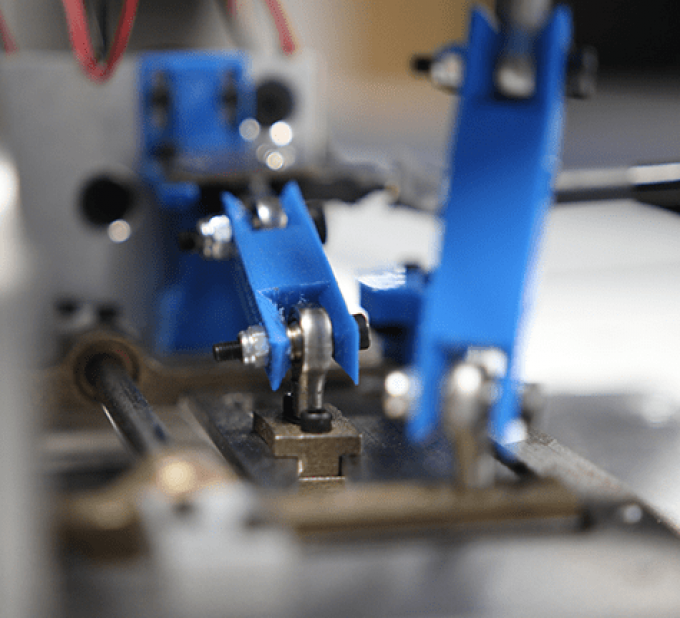China's ecommerce giants revamp strategy to get round new US rules
The ecommerce titans are quickly adapting their business models in the face of greater regulatory ...
GM: RAISING THE ROOF GGM: IN FULL THROTTLE GZIM: MAERSK BOOST KNIN: READ-ACROSSMAERSK: NOT ENOUGHMAERSK: GUIDANCE UPGRADEZIM: ROLLERCOASTERCAT: HEAVY DUTYMAERSK: CATCHING UP PG: DESTOCKING PATTERNSPG: HEALTH CHECKWTC: THE FALLGXO: DEFENSIVE FWRD: RALLYING ON TAKEOVER TALKODFL: STEADY YIELDVW: NEW MODEL NEEDEDWTC: TAKING PROFIT
GM: RAISING THE ROOF GGM: IN FULL THROTTLE GZIM: MAERSK BOOST KNIN: READ-ACROSSMAERSK: NOT ENOUGHMAERSK: GUIDANCE UPGRADEZIM: ROLLERCOASTERCAT: HEAVY DUTYMAERSK: CATCHING UP PG: DESTOCKING PATTERNSPG: HEALTH CHECKWTC: THE FALLGXO: DEFENSIVE FWRD: RALLYING ON TAKEOVER TALKODFL: STEADY YIELDVW: NEW MODEL NEEDEDWTC: TAKING PROFIT

The retail supply chain could be “crushed” by new technology that would allow consumers to buy personalised apparel, locally made.
While there has been much scepticism over 3D-printing and robotics in the logistics market, now that applications for the technologies are being found, the future is becoming easier to predict. And it involves shorter, cheaper supply chains for fashion logistics.
Nike, famously, has already been using 3D printing for customised sport shoes. But perhaps most critically for the fast fashion industry, ‘Sewbots’ – something of a mixture of AI, robotics and 3D printing – could be a true game changer.
According to Transport Intelligence’s latest report, Global E-commerce Logistics 2018, Chinese contract manufacturer Tianyuan Garments Company is building a plant in Little Rock, Arkansas, US, manned by sewbots.
“These are robots that can manufacture clothing; in this case t-shirts for German company Adidas, incredibly fast,” notes the report.
“The bots can cut and sew a new shirt every 22 seconds from very soft and flexible fabric. This was something that was impossible to conceive a few years ago. The designs can also be changed very swiftly according to market demand.”
Most importantly for the supply chain, sewbots can cut reverse logistics and shorten supply chains considerably.
Together with technology which allows customers to take a photo pf themselves via an app, which will gather precise body measurements, the data will be sent straight to the nearest plant, where sewbots will make the item of clothing.
As Ti notes: “The implications for conventional fashion retailers are clear, this kind of innovation, if successful will present an existential threat unless they can respond. Quality of design and materials will provide some degree of defence, but as Inditex (Zara) has shown, unless the feedback loop from the store and the manufacturing and logistics operate as a seamless system, it is only a matter of time before the inevitable happens.”
The pace of change introduced by the likes of Zara and Asos, with four-to-six-week turnaround from design to shelf, has led to large amounts of excessive inventory in slower chains. One way to reduce costs, of course, is to source from cheaper labour markets.
But, as Palaniswamy Rajan, chairman and ceo of Atlanta-based SoftWear Automation, told Forbes magazine last month: “If we can manufacture goods in the US at the same costs as overseas, and the bulk of that cost is in labour, then why wouldn’t you manufacture here? Through our technology, we are enabling a local supply chain.”
He added: “It will crush the retail supply chain. You can have zero inventory and a batch size of one. You can’t do that overseas. We enable seamless commerce from manufacturing to retail.”
And the technology will root out the vast majority of returns, the rate of which is between 25% and 50%, and account for one of the more challenging and expensive parts of the e-commerce business.
Returns costs, noted Ti, can be as high as 50%-60% in the fashion sector.
At the moment, the technology currently focuses on easy pickings, such as t-shirts. But on-demand manufacturing in apparel, with potentially limitless styles, made locally, could significantly alter the way fast fashion – and even slow fashion – moves.
You can buy the Transport Intelligence report here.
Comment on this article
Mark Higgins
March 09, 2018 at 2:57 pmAre there any companies that are doing any Manmade Leather (PU) looks in Mens shoes that you know of? I have seen some in the Athletic world, but not necessarily in the Dress/Casual arena